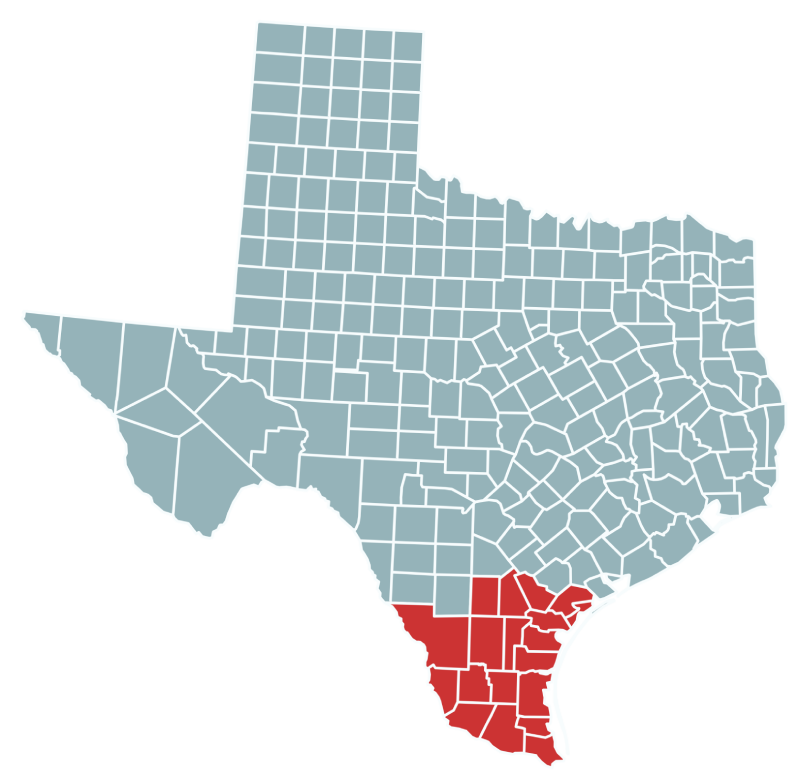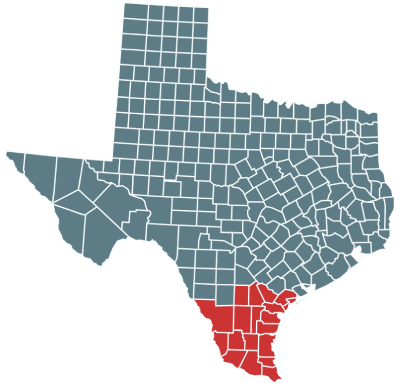Study Center: Texas
Approximately one in ten infants in the United States are born in Texas.
In 1996, the Texas Center for Birth Defects Research and Prevention was established as a part of the Birth Defects Epidemiology and Surveillance Branch of the Texas Department of State Health Services in Austin. The mission of the Texas Center is to conduct population-based epidemiologic research studies to understand the causes of specific birth defects, including participation in the National Birth Defects Prevention Study.
The Texas Center is in a unique position to contribute to our understanding of what causes birth defects, especially due to the 1,200-mile border shared with Mexico. Health disparities between Texans living along the border with Mexico and those in non-border communities have long been a concern for public health officials. The national study area for Texas was the Lower Rio Grande Valley, which encompasses Gulf Coast industrial cities such as Corpus Christi, as well as Cameron and Webb Counties. These two counties on the border with Mexico have experienced some of the country's highest neural tube defect rates.
Contact
Phone: 512-776-7232
Website: www.dshs.state.tx.us
E-Mail: birthdefects@dshs.state.tx.us
Principal Investigators
Dr. Lupo
Professor of Pediatrics
Dr. Lupo is a genetic epidemiologist, Professor of Pediatrics at Baylor College of Medicine, Endowed Chair of Molecular Epidemiology at Texas Children’s Hospital, and Director of the Epidemiology and Population Sciences Program in the Texas Children’s Cancer and Hematology Center. One of Dr. Lupo’s research interests is leveraging population-based registry data to inform our understanding of the genetic etiologies of birth defects, as well as cancer risk in individuals with birth defects. He has several ongoing studies focused on birth defects, has been an active investigator in the NBDPS and BD-STEPS, and has held leadership roles in both the National Birth Defects Prevention Network and the Society for Birth Defects Research and Prevention.


Dr. Shumate
Director of the Birth Defects Epidemiology
Dr. Shumate, Director of the Birth Defects Epidemiology and Surveillance Branch at Texas Department of State Health Services. One of Dr. Shumate’s research interests is helping to develop a better understanding between social determinants of health and the occurrence of birth defects. He has been a collaborator in the NBDPS and BD-STEPS.
Dr. Agopian
Associate Professor
Dr. Agopian is an Associate Professor in the Department of Epidemiology at the UTHealth School of Public Health. Research interests include a broad range of maternal and infant birth defects risk factors, genomics, outcomes among infants with birth defects, and surveillance and classification methodology. In addition to the National Birth Defects Prevention Study (NBDPS) and the Birth Defects Study To Evaluate Pregnancy exposureS (BD-STEPS), Dr. Agopian collaborates with investigators on research over a range of local, national, and international birth defects datasets.
Local Activities and Research
In addition to participating in the National Birth Defects Prevention Study (NBDPS) and the Birth Defects Study To Evaluate Pregnancy exposureS (BD-STEPS), the Texas Center for Birth Defects Research and Prevention has conducted many local research projects, including studies that examine:
- The interaction of metabolic, genetic, and environmental risk factors for certain birth defects of the brain and spinal cord
- The link between neural tube defects and maternal risk factors, such as maternal diabetes, obesity, smoking, and dieting behaviors
- The relationship between birth defects and certain environmental factors, such as hazardous waste sites and air pollution
- Patterns and risk factors associated with oral clefts and clubfoot in Texas
- Outcomes such as mortality and preterm birth among individuals with birth defects
- Co-occurrence of birth defects and childhood cancers
- Patterns of multiple birth defects co-occurrence
Notable Research Findings
Raut, J. R., R. M. Simeone, S. C. Tinker, M. A. Canfield, R. S. Day and A. J. Agopian (2019). "Proportion of Orofacial Clefts Attributable to Recognized Risk Factors." Cleft Palate Craniofac J 56(2): 151-158.
Benjamin, R. H., Mitchell, L. E., Canfield, M. A., Hoyt, A. T., Lai, D., Ramadhani, T. A., Carmichael, S. L., Case, A. P., Waller, D. K., & National Birth Defects Prevention Study (2019). Fish consumption prior to pregnancy and pregnancy outcomes in the National Birth Defects Prevention Study, 1997-2011. Public health nutrition, 22(2), 336–343. https://doi.org/10.1017/S1368980018002641
Hoang, T. T., Lei, Y., Mitchell, L. E., Sharma, S. V., Swartz, M. D., Waller, D. K., Finnell, R. H., Benjamin, R. H., Browne, M. L., Canfield, M. A., Lupo, P. J., McKenzie, P., Shaw, G. M., Agopian, A. J., & National Birth Defects Prevention Study (2019). Maternal genetic markers for risk of celiac disease and their potential association with neural tube defects in offspring. Molecular genetics & genomic medicine, 7(6), e688. https://doi.org/10.1002/mgg3.688
Hoang, T. T., Lei, Y., Mitchell, L. E., Sharma, S. V., Swartz, M. D., Waller, D. K., Finnell, R. H., Benjamin, R. H., Browne, M. L., Canfield, M. A., Lupo, P. J., McKenzie, P., Shaw, G., Agopian, A. J., & National Birth Defects Prevention Study (2019). Maternal Lactase Polymorphism (rs4988235) Is Associated with Neural Tube Defects in Offspring in the National Birth Defects Prevention Study. The Journal of nutrition, 149(2), 295–303. https://doi.org/10.1093/jn/nxy246
Hoyt, A. T., Shumate, C. J., Canfield, M. A., Le, M., Ramadhani, T., Scheuerle, A. E., & National Birth Defects Prevention Study (2019). Selected acculturation factors and birth defects in the National Birth Defects Prevention Study, 1997-2011. Birth defects research, 111(10), 598–612. https://doi.org/10.1002/bdr2.1494
Hoyt, A. T., Ramadhani, T., Le, M. T., Shumate, C. J., Canfield, M. A., Scheuerle, A. E., & National Birth Defects Prevention Study (2020). Acculturation and selected birth defects among non-Hispanic Blacks in a population-based case-control study. Birth defects research, 112(7), 535–554. https://doi.org/10.1002/bdr2.1665
Lei, Y., Ludorf, K. L., Yu, X., Benjamin, R. H., Gu, X., Lin, Y., Finnell, R. H., Mitchell, L. E., Musfee, F. I., Malik, S., Canfield, M. A., Morrison, A. C., Hobbs, C. A., Van Zutphen, A. R., Fisher, S., Agopian, A. J., & National Birth Defects Prevention Study (2020). Maternal hypertension-related genotypes and congenital heart defects. American journal of hypertension, hpaa116. Advance online publication. https://doi.org/10.1093/ajh/hpaa116
Patel, J., Nembhard, W. N., Politis, M. D., Rocheleau, C. M., Langlois, P. H., Shaw, G. M., Romitti, P. A., Gilboa, S. M., Desrosiers, T. A., Insaf, T., Lupo, P. J. & National Birth Defects Prevention Study (2020). Maternal occupational exposure to polycyclic aromatic hydrocarbons and the risk of isolated congenital heart defects among offspring. Environmental Research, 186, 109550. https://doi.org/10.1016/j.envres.2020.109550
Mohan Dass, N. L., Botto, L. D., Tinker, S. C., Canfield, M. A., Finnell, R. H., Gallaway, M. S., Hashmi, S. S., Hoyt, A. T., Nembhard, W. N., Waller, D. K., & National Birth Defects Prevention Study (2022). Associations between maternal reports of periconceptional fever from miscellaneous causes and structural birth defects. Birth defects research, 10.1002/bdr2.2068. Advance online publication. https://doi.org/10.1002/bdr2.2068
Partners
The Texas Center is comprised of State Health Department employees and researchers from various Texas universities with expertise in demographic, maternal, and environmental risk factors for birth defects, survey research, and molecular genetics.
Baylor College of Medicine – Houston, TX
Texas A&M University, School of Public Health – College Station
Texas State University – San Marcos
The University of Texas School of Public Health – Houston
The University of Texas Medical School – Houston


